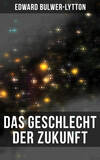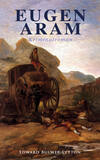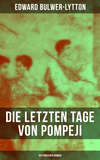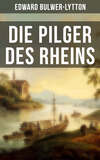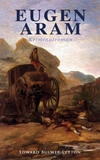Kitabı oku: «A Strange Story — Complete», sayfa 25
“Call out,” I hissed in his ear, “and I strangle you before any one can come to your help.”
He did not call out; his eye, fixed on mine as he writhed round, saw, perhaps, his peril if he did. His countenance betrayed fear, but as I tightened my grasp that expression gave way to one of wrath and fierceness; and as, in turn, I felt the grip of his hand, I knew that the struggle between us would be that of two strong men, each equally bent on the mastery of the other.
I was, as I have said before, endowed with an unusual degree of physical power, disciplined in early youth by athletic exercise and contest. In height and in muscle I had greatly the advantage over my antagonist; but such was the nervous vigour, the elastic energy of his incomparable frame, in which sinews seemed springs of steel, that had our encounter been one in which my strength was less heightened by rage, I believe that I could no more have coped with him than the bison can cope with the boa; but I was animated by that passion which trebles for a time all our forces,—which makes even the weak man a match for the strong. I felt that if I were worsted, disabled, stricken down, Lilian might be lost in losing her sole protector; and on the other hand, Margrave had been taken at the disadvantage of that surprise which will half unnerve the fiercest of the wild beasts; while as we grappled, reeling and rocking to and fro in our struggle, I soon observed that his attention was distracted,—that his eye was turned towards an object which he had dropped involuntarily when I first seized him. He sought to drag me towards that object, and when near it stooped to seize. It was a bright, slender, short wand of steel. I remembered when and where I had seen it, whether in my waking state or in vision; and as his hand stole down to take it from the floor, I set on the wand my strong foot. I cannot tell by what rapid process of thought and association I came to the belief that the possession of a little piece of blunted steel would decide the conflict in favor of the possessor; but the struggle now was concentred on the attainment of that seemingly idle weapon. I was becoming breathless and exhausted, while Margrave seemed every moment to gather up new force, when collecting all my strength for one final effort, I lifted him suddenly high in the air, and hurled him to the farthest end of the cramped arena to which our contest was confined. He fell, and with a force by which most men would have been stunned; but he recovered himself with a quick rebound, and, as he stood facing me, there was something grand as well as terrible in his aspect. His eyes literally flamed, as those of a tiger; his rich hair, flung back from his knitted forehead, seemed to erect itself as an angry mane; his lips, slightly parted, showed the glitter of his set teeth; his whole frame seemed larger in the tension of the muscles, and as, gradually relaxing his first defying and haughty attitude, he crouched as the panther crouches for its deadly spring, I felt as if it were a wild beast, whose rush was coming upon me,—wild beast, but still Man, the king of the animals, fashioned forth from no mixture of humbler races by the slow revolutions of time, but his royalty stamped on his form when the earth became fit for his coming.26
At that moment I snatched up the wand, directed it towards him, and advancing with a fearless stride, cried,—
“Down to my feet, miserable sorcerer!”
To my own amaze, the effect was instantaneous. My terrible antagonist dropped to the floor as a dog drops at the word of his master. The muscles of his frowning countenance relaxed, the glare of his wrathful eyes grew dull and rayless; his limbs lay prostrate and unnerved, his head rested against the wall, his arms limp and drooping by his side. I approached him slowly and cautiously; he seemed cast into a profound slumber.
“You are at my mercy now!” said I.
He moved his head as in sign of deprecating submission.
“You hear and understand me? Speak!”
His lips faintly muttered, “Yes.”
“I command you to answer truly the questions I shall address to you.”
“I must, while yet sensible of the power that has passed to your hand.”
“Is it by some occult magnetic property in this wand that you have exercised so demoniac an influence over a creature so pure as Lilian Ashleigh?”
“By that wand and by other arts which you could not comprehend.”
“And for what infamous object,—her seduction, her dishonour?”
“No! I sought in her the aid of a gift which would cease did she cease to be pure. At first I but cast my influence upon her that through her I might influence yourself. I needed your help to discover a secret. Circumstances steeled your mind against me. I could no longer hope that you would voluntarily lend yourself to my will. Meanwhile, I had found in her the light of a loftier knowledge than that of your science; through that knowledge, duly heeded and cultivated, I hoped to divine what I cannot of myself discover. Therefore I deepened over her mind the spells I command; therefore I have drawn her hither as the loadstone draws the steel, and therefore I would have borne her with me to the shores to which I was about this night to sail. I had cast the inmates of the house and all around it into slumber, in order that none might witness her departure; had I not done so, I should have summoned others to my aid, in spite of your threat.”
“And would Lilian Ashleigh have passively accompanied you, to her own irretrievable disgrace?”
“She could not have helped it; she would have been unconscious of her acts; she was, and is, in a trance; nor, had she gone with me, would she have waked from that state while she lived; that would not have been long.”
“Wretch! and for what object of unhallowed curiosity do you exert an influence which withers away the life of its victim?”
“Not curiosity, but the instinct of self-preservation. I count on no life beyond the grave. I would defy the grave, and live on.”
“And was it to learn, through some ghastly agencies, the secret of renewing existence, that you lured me by the shadow of your own image on the night when we met last?”
The voice of Margrave here became very faint as he answered me, and his countenance began to exhibit the signs of an exhaustion almost mortal.
“Be quick,” he murmured, “or I die. The fluid which emanates from that wand, in the hand of one who envenoms that fluid with his own hatred and rage, will prove fatal to my life. Lower the wand from my forehead! low—low,—lower still!”
“What was the nature of that rite in which you constrained me to share?”
“I cannot say. You are killing me. Enough that you were saved from a great danger by the apparition of the protecting image vouchsafed to your eye; otherwise you would—you would—Oh, release me! Away! away!”
The foam gathered to his lips; his limbs became fearfully convulsed.
“One question more: where is Lilian at this moment? Answer that question, and I depart.”
He raised his head, made a visible effort to rally his strength, and gasped out,—
“Yonder. Pass through the open space up the cliff, beside a thorn-tree; you will find her there, where she halted when the wand dropped from my hand. But—but—beware! Ha! you will serve me yet, and through her! They said so that night, though you heard them not. They said it!” Here his face became death-like; he pressed his hand on his heart, and shrieked out, “Away! away! or you are my murderer!”
I retreated to the other end of the room, turning the wand from him, and when I gained the door, looked back; his convulsions had ceased, but he seemed locked in a profound swoon.
I left the room,—the house,—paused by Waby; he was still sleeping. “Awake!” I said, and touched him with the wand. He started up at once, rubbed his eyes, began stammering out excuses. I checked them, and bade him follow me. I took the way up the open ground towards which Margrave had pointed the wand, and there, motionless, beside a gnarled fantastic thorn-tree, stood Lilian. Her arms were folded across her breast; her face, seen by the moonlight, looked so innocent and so infantine, that I needed no other evidence to tell me how unconscious she was of the peril to which her steps had been drawn. I took her gently by the hand. “Come with me,” I said in a whisper, and she obeyed me silently, and with a placid smile.
Rough though the way, she seemed unconscious of fatigue. I placed her arm in mine, but she did not lean on it. We got back to the town. I obtained there an old chaise and a pair of horses. At morning Lilian was under her mother’s roof. About the noon of that day fever seized her; she became rapidly worse, and, to all appearance, in imminent danger. Delirium set in; I watched beside her night and day, supported by an inward conviction of her recovery, but tortured by the sight of her sufferings. On the third day a change for the better became visible; her sleep was calm, her breathing regular.
Shortly afterwards she woke out of danger. Her eyes fell at once on me, with all their old ineffable tender sweetness.
“Oh, Allen, beloved, have I not been very ill? But I am almost well now. Do not weep; I shall live for you,—for your sake.” And she bent forward, drawing my hand from my streaming eyes, and kissed me with a child’s guileless kiss on my burning forehead.
CHAPTER LVI
Lilian recovered, but the strange thing was this: all memory of the weeks that had elapsed since her return from visiting her aunt was completely obliterated; she seemed in profound ignorance of the charge on which I had been confined,—perfectly ignorant even of the existence of Margrave. She had, indeed, a very vague reminiscence of her conversation with me in the garden,—the first conversation which had ever been embittered by a disagreement,—but that disagreement itself she did not recollect. Her belief was that she had been ill and light-headed since that evening. From that evening to the hour of her waking, conscious and revived, all was a blank. Her love for me was restored, as if its thread had never been broken. Some such instances of oblivion after bodily illness or mental shock are familiar enough to the practice of all medical men;27 and I was therefore enabled to appease the anxiety and wonder of Mrs. Ashleigh, by quoting various examples of loss, or suspension, of memory. We agreed that it would be necessary to break to Lilian, though very cautiously, the story of Sir Philip Derval’s murder, and the charge to which I had been subjected. She could not fail to hear of those events from others. How shall I express her womanly terror, her loving, sympathizing pity, on hearing the tale, which I softened as well as I could?
“And to think that I knew nothing of this!” she cried, clasping my hand; “to think that you were in peril, and that I was not by your side!”
Her mother spoke of Margrave, as a visitor,—an agreeable, lively stranger; Lilian could not even recollect his name, but she seemed shocked to think that any visitor had been admitted while I was in circumstances so awful! Need I say that our engagement was renewed? Renewed! To her knowledge and to her heart it had never been interrupted for a moment. But oh! the malignity of the wrong world! Oh, that strange lust of mangling reputations, which seizes on hearts the least wantonly cruel! Let two idle tongues utter a tale against some third person, who never offended the babblers, and how the tale spreads, like fire, lighted none know how, in the herbage of an American prairie! Who shall put it out?
What right have we to pry into the secrets of other men’s hearths? True or false, the tale that is gabbled to us, what concern of ours can it be? I speak not of cases to which the law has been summoned, which law has sifted, on which law has pronounced. But how, when the law is silent, can we assume its verdicts? How be all judges where there has been no witness-box, no cross-examination, no jury? Yet, every day we put on our ermine, and make ourselves judges,—judges sure to condemn, and on what evidence? That which no court of law will receive. Somebody has said something to somebody, which somebody repeats to everybody!
The gossip of L—— had set in full current against Lilian’s fair name. No ladies had called or sent to congratulate Mrs. Ashleigh on her return, or to inquire after Lilian herself during her struggle between life and death.
How I missed the Queen of the Hill at this critical moment! How I longed for aid to crush the slander, with which I knew not how to grapple,—aid in her knowledge of the world and her ascendancy over its judgments! I had heard from her once since her absence, briefly but kindly expressing her amazement at the ineffable stupidity which could for a moment have subjected me to a suspicion of Sir Philip Derval’s strange murder, and congratulating me heartily on my complete vindication from so monstrous a charge. To this letter no address was given. I supposed the omission to be accidental, but on calling at her house to inquire her direction, I found that the servants did not know it.
What, then, was my joy when just at this juncture I received a note from Mrs. Poyntz, stating that she had returned the night before, and would be glad to see me.
I hastened to her house. “Ah,” thought I, as I sprang lightly up the ascent to the Hill, “how the tattlers will be silenced by a word from her imperial lips!” And only just as I approached her door did it strike me how difficult—nay, how impossible—to explain to her—the hard positive woman, her who had, less ostensibly but more ruthlessly than myself, destroyed Dr. Lloyd for his belief in the comparatively rational pretensions of clairvoyance—all the mystical excuses for Lilian’s flight from her home? How speak to her—or, indeed, to any one—about an occult fascination and a magic wand? No matter: surely it would be enough to say that at the time Lilian had been light-headed, under the influence of the fever which had afterwards nearly proved fatal, The early friend of Anne Ashleigh would not be a severe critic on any tale that might right the good name of Anne Ashleigh’s daughter. So assured, with a light heart and a cheerful face, I followed the servant into the great lady’s pleasant but decorous presence-chamber.
CHAPTER LVII
Mrs. Poyntz was on her favourite seat by the window, and for a wonder, not knitting—that classic task seemed done; but she was smoothing and folding the completed work with her white comely hand, and smiling over it, as if in complacent approval, when I entered the room. At the fire-side sat the he-colonel inspecting a newly-invented barometer; at another window, in the farthest recess of the room, stood Miss Jane Poyntz, with a young gentleman whom I had never before seen, but who turned his eyes full upon me with a haughty look as the servant announced my name. He was tall, well proportioned, decidedly handsome, but with that expression of cold and concentred self-esteem in his very attitude, as well as his countenance, which makes a man of merit unpopular, a man without merit ridiculous.
The he-colonel, always punctiliously civil, rose from his seat, shook hands with me cordially, and said, “Coldish weather to-day; but we shall have rain to-morrow. Rainy seasons come in cycles. We are about to commence a cycle of them with heavy showers.” He sighed, and returned to his barometer.
Miss Jane bowed to me graciously enough, but was evidently a little confused,—a circumstance which might well attract my notice, for I had never before seen that high-bred young lady deviate a hairsbreadth from the even tenor of a manner admirable for a cheerful and courteous ease, which, one felt convinced, would be unaltered to those around her if an earthquake swallowed one up an inch before her feet.
The young gentleman continued to eye me loftily, as the heir-apparent to some celestial planet might eye an inferior creature from a half-formed nebula suddenly dropped upon his sublime and perfected, star.
Mrs. Poyntz extended to me two fingers, and said frigidly, “Delighted to see you again! How kind to attend so soon to my note!”
Motioning me to a seat beside her, she here turned to her husband, and said, “Poyntz, since a cycle of rain begins tomorrow, better secure your ride to-day. Take these young people with you. I want to talk with Dr. Fenwick.”
The colonel carefully put away his barometer, and saying to his daughter, “Come!” went forth. Jane followed her father; the young gentleman followed Jane.
The reception I had met chilled and disappointed me. I felt that Mrs. Poyntz was changed, and in her change the whole house seemed changed. The very chairs looked civilly unfriendly, as if preparing to turn their backs on me. However, I was not in the false position of an intruder; I had been summoned; it was for Mrs. Poyntz to speak first, and I waited quietly for her to do so.
She finished the careful folding of her work, and then laid it at rest in the drawer of the table at which she sat. Having so done, she turned to me, and said,—
“By the way, I ought to have introduced to you my young guest, Mr. Ashleigh Sumner. You would like him. He has talents,—not showy, but solid. He will succeed in public life.”
“So that young man is Mr. Ashleigh Sumner? I do not wonder that Miss Ashleigh rejected him.”
I said this, for I was nettled, as well as surprised, at the coolness with which a lady who had professed a friendship for me mentioned that fortunate young gentleman, with so complete an oblivion of all the antecedents that had once made his name painful to my ear.
In turn, my answer seemed to nettle Mrs. Poyntz.
“I am not so sure that she did reject; perhaps she rather misunderstood him; gallant compliments are not always proposals of marriage. However that be, his spirits were not much damped by Miss Ashleigh’s disdain, nor his heart deeply smitten by her charms; for he is now very happy, very much attached to another young lady, to whom he proposed three days ago, at Lady Delafield’s, and not to make a mystery of what all our little world will know before tomorrow, that young lady is my daughter Jane.”
“Were I acquainted with Mr. Sumner, I should offer to him my sincere congratulations.”
Mrs. Poyntz resumed, without heeding a reply more complimentary to Miss Jane than to the object of her choice,—
“I told you that I meant Jane to marry a rich country gentleman, and Ashleigh Sumner is the very country gentleman I had then in my thoughts. He is cleverer and more ambitious than I could have hoped; he will be a minister some day, in right of his talents, and a peer, if he wishes it, in right of his lands. So that matter is settled.”
There was a pause, during which my mind passed rapidly through links of reminiscence and reasoning, which led me to a mingled sentiment of admiration for Mrs. Poyntz as a diplomatist and of distrust for Mrs. Poyntz as a friend. It was now clear why Mrs. Poyntz, before so little disposed to approve my love, had urged me at once to offer my hand to Lilian, in order that she might depart affianced and engaged to the house in which she would meet Mr. Ashleigh Sumner. Hence Mrs. Poyntz’s anxiety to obtain all the information I could afford her of the sayings and doings at Lady Haughton’s; hence, the publicity she had so suddenly given to my engagement; hence, when Mr. Sumner had gone away a rejected suitor, her own departure from L——; she had seized the very moment when a vain and proud man, piqued by the mortification received from one lady, falls the easier prey to the arts which allure his suit to another. All was so far clear to me. And I—was my self-conceit less egregious and less readily duped than that of yon glided popinjay’s! How skilfully this woman had knitted me into her work with the noiseless turn of her white hands! and yet, forsooth, I must vaunt the superior scope of my intellect, and plumb all the fountains of Nature,—I, who could not fathom the little pool of this female schemer’s mind!
But that was no time for resentment to her or rebuke to myself. She was now the woman who could best protect and save from slander my innocent, beloved Lilian. But how approach that perplexing subject?
Mrs. Poyntz approached it, and with her usual decision of purpose, which bore so deceitful a likeness to candour of mind.
“But it was not to talk of my affairs that I asked you to call, Allen Fenwick.” As she uttered my name, her voice softened, and her manner took that maternal, caressing tenderness which had sometimes amused and sometimes misled me. “No, I do not forget that you asked me to be your friend, and I take without scruple the license of friendship. What are these stories that I have heard already about Lilian Ashleigh, to whom you were once engaged?”
“To whom I am still engaged.”
“Is it possible? Oh, then, of course the stories I have heard are all false. Very likely; no fiction in scandal ever surprises me. Poor dear Lilian, then, never ran away from her mother’s house?”
I smothered the angry pain which this mode of questioning caused me; I knew how important it was to Lilian to secure to her the countenance and support of this absolute autocrat; I spoke of Lilian’s long previous distemper of mind; I accounted for it as any intelligent physician, unacquainted with all that I could not reveal, would account. Heaven forgive me for the venial falsehood, but I spoke of the terrible charge against myself as enough to unhinge for a time the intellect of a girl so acutely sensitive as Lilian; I sought to create that impression as to the origin of all that might otherwise seem strange; and in this state of cerebral excitement she had wandered from home—but alone. I had tracked every step of her way; I had found and restored her to her home. A critical delirium had followed, from which she now rose, cured in health, unsuspicious that there could be a whisper against her name. And then, with all the eloquence I could command, and in words as adapted as I could frame them to soften the heart of a woman, herself a mother, I implored Mrs. Poyntz’s aid to silence all the cruelties of calumny, and extend her shield over the child of her own early friend.
When I came to an end, I had taken, with caressing force, Mrs. Poyntz’s reluctant hands in mine. There were tears in my voice, tears in my eyes. And the sound of her voice in reply gave me hope, for it was unusually gentle. She was evidently moved. The hope was soon quelled.
“Allen Fenwick,” she said, “you have a noble heart; I grieve to see how it abuses your reason. I cannot aid Lilian Ashleigh in the way you ask. Do not start back so indignantly. Listen to me as patiently as I have listened to you. That when you brought back the unfortunate young woman to her poor mother, her mind was disordered, and became yet more dangerously so, I can well believe; that she is now recovered, and thinks with shame, or refuses to think at all, of her imprudent flight, I can believe also; but I do not believe, the World cannot believe, that she did not, knowingly and purposely, quit her mother’s roof, and in quest of that young stranger so incautiously, so unfeelingly admitted to her mother’s house during the very time you were detained on the most awful of human accusations. Every one in the town knows that Mr. Margrave visited daily at Mrs. Ashleigh’s during that painful period; every one in the town knows in what strange out-of-the-way place this young man had niched himself; and that a yacht was bought, and lying in wait there. What for? It is said that the chaise in which you brought Miss Ashleigh back to her home was hired in a village within an easy reach of Mr. Margrave’s lodging—of Mr. Margrave’s yacht. I rejoice that you saved the poor girl from ruin; but her good name is tarnished; and if Anne Ashleigh, whom I sincerely pity, asks me my advice, I can but give her this: ‘Leave L——, take your daughter abroad; and if she is not to marry Mr. Margrave, marry her as quietly and as quickly as possible to some foreigner.’”
“Madam! madam! this, then, is your friendship to her—to me! Oh, shame on you to insult thus an affianced husband! Shame on me ever to have thought you had a heart!”
“A heart, man!” she exclaimed, almost fiercely, springing up, and startling me with the change in her countenance and voice. “And little you would have valued, and pitilessly have crushed this heart, if I had suffered myself to show it to you! What right have you to reproach me? I felt a warm interest in your career, an unusual attraction in your conversation and society. Do you blame me for that, or should I blame myself? Condemned to live amongst brainless puppets, my dull occupation to pull the strings that moved them, it was a new charm to my life to establish friendship and intercourse with intellect and spirit and courage. Ah! I understand that look, half incredulous, half inquisitive.”
“Inquisitive, no; incredulous, yes! You desired my friendship, and how does your harsh judgment of my betrothed wife prove either to me or to her mother, whom you have known from your girlhood, the first duty of a friend,—which is surely not that of leaving a friend’s side the moment that he needs countenance in calumny, succour in trouble!”
“It is a better duty to prevent the calumny and avert the trouble. Leave aside Anne Ashleigh, a cipher that I can add or abstract from my sum of life as I please. What is my duty to yourself? It is plain. It is to tell you that your honour commands you to abandon all thoughts of Lilian Ashleigh as your wife. Ungrateful that you are! Do you suppose it was no mortification to my pride of woman and friend, that you never approached me in confidence except to ask my good offices in promoting your courtship to another; no shock to the quiet plans I had formed as to our familiar though harmless intimacy, to hear that you were bent on a marriage in which my friend would be lost to me?”
“Not lost! not lost! On the contrary, the regard I must suppose you had for Lilian would have been a new link between our homes.”
“Pooh! Between me and that dreamy girl there could have been no sympathy, there could have grown up no regard. You would have been chained to your fireside, and—and—but no matter. I stifled my disappointment as soon as I felt it,—stifled it, as all my life I have stifled that which either destiny or duty—duty to myself as to others—forbids me to indulge. Ah, do not fancy me one of the weak criminals who can suffer a worthy liking to grow into a debasing love! I was not in love with you, Allen Fenwick.”
“Do you think I was ever so presumptuous a coxcomb as to fancy it?”
“No,” she said, more softly; “I was not so false to my household ties and to my own nature. But there are some friendships which are as jealous as love. I could have cheerfully aided you in any choice which my sense could have approved for you as wise; I should have been pleased to have found in such a wife my most intimate companion. But that silly child!—absurd! Nevertheless, the freshness and enthusiasm of your love touched me; you asked my aid, and I gave it. Perhaps I did believe that when you saw more of Lilian Ashleigh you would be cured of a fancy conceived by the eye—I should have known better what dupes the wisest men can be to the witcheries of a fair face and eighteen! When I found your illusion obstinate, I wrenched myself away from a vain regret, turned to my own schemes and my own ambition, and smiled bitterly to think that, in pressing you to propose so hastily to Lilian, I made your blind passion an agent in my own plans. Enough of this. I speak thus openly and boldly to you now, because now I have not a sentiment that can interfere with the dispassionate soundness of my counsels. I repeat, you cannot now marry Lilian Ashleigh; I cannot take my daughter to visit her; I cannot destroy the social laws that I myself have set in my petty kingdom.”
“Be it as you will. I have pleaded for her while she is still Lilian Ashleigh. I plead for no one to whom I have once given my name. Before the woman whom I have taken from the altar, I can place, as a shield sufficient, my strong breast of man. Who has so deep an interest in Lilian’s purity as I have? Who is so fitted to know the exact truth of every whisper against her? Yet when I, whom you admit to have some reputation for shrewd intelligence,—I, who tracked her way,—I, who restored her to her home,—when I, Allen Fenwick, am so assured of her inviolable innocence in thought as in deed, that I trust my honour to her keeping,—surely, surely, I confute the scandal which you yourself do not believe, though you refuse to reject and to annul it?”
“Do not deceive yourself, Allen Fenwick,” said she, still standing beside me, her countenance now hard and stern. “Look where I stand, I am the World! The World, not as satirists depreciate, or as optimists extol its immutable properties, its all-persuasive authority. I am the World! And my voice is the World’s voice when it thus warns you. Should you make this marriage, your dignity of character and position would be gone! If you look only to lucre and professional success, possibly they may not ultimately suffer. You have skill, which men need; their need may still draw patients to your door and pour guineas into your purse. But you have the pride, as well as the birth of a gentleman, and the wounds to that pride will be hourly chafed and never healed. Your strong breast of man has no shelter to the frail name of woman. The World, in its health, will look down on your wife, though its sick may look up to you. This is not all. The World, in its gentlest mood of indulgence, will say compassionately, ‘Poor man! how weak, and how deceived! What an unfortunate marriage!’ But the World is not often indulgent,—it looks most to the motives most seen on the surface. And the World will more frequently say, ‘No; much too clever a man to be duped! Miss Ashleigh had money. A good match to the man who liked gold better than honour.’”
And yet, even if we entirely omit the consideration of the soul, that immaterial and immortal principle which is for a time united to his body, and view him only in his merely animal character, man is still the most excellent of animals.—Dr. Kidd, On the Adaptation of External Nature to the Physical Condition of Man (Sect. iii. p. 18).
[Закрыть]
Such instances of suspense of memory are recorded in most physiological and in some metaphysical works. Dr. Abercrombie notices some, more or less similar to that related in the text: “A young lady who was present at a catastrophe in Scotland, in which many people lost their lives by the fall of the gallery of a church, escaped without any injury, but with the complete loss of the recollection of any of the circumstances; and this extended not only to the accident, but to everything that had occurred to her for a certain time before going to church. A lady whom I attended some years ago in a protracted illness, in which her memory became much impaired, lost the recollection of a period of about ten or twelve years, but spoke with perfect consistency of things as they stood before that time.” Dr. Aberercmbie adds: “As far as I have been able to trace it, the principle in such cases seems to be, that when the memory is impaired to a certain degree, the loss of it extends backward to some event or some period by which a particularly deep impression had been made upon the mind.”—ABERCROMBIE: On the Intellectual Powers, pp. 118, 119 (15th edition).
[Закрыть]




